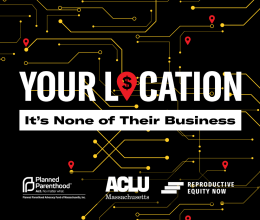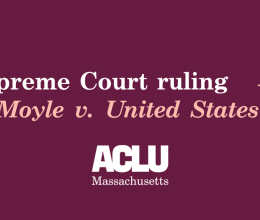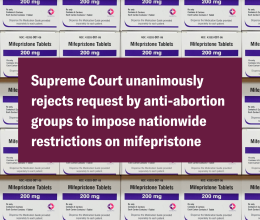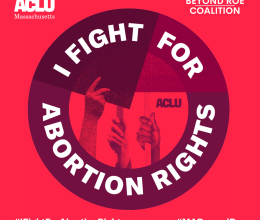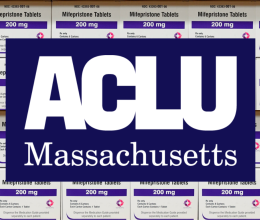
The U.S. Supreme Court will today hear oral arguments in FDA v. Alliance for Hippocratic Medicine, a case that could have serious effects on people’s ability to access abortion and miscarriage care nationwide. The case could make it more difficult for people across the country to access mifepristone, a medication used in abortion and miscarriage treatment.
Carol Rose, Executive Director of the ACLU of Massachusetts, issued the following statement in advance of today’s hearing:
“Mifepristone is safe, effective, and has been used by millions of people since it was approved by the FDA more than 20 years ago. But anti-abortion groups are ignoring science in an effort to force harsh restrictions on the medication in every state across the country. Let’s be clear: This is yet another step toward extremists’ goal to ban abortion nationwide.
“We know that anti-abortion extremists are getting more sophisticated in their attacks on abortion access — even in states that have passed legal protections for abortion. And we know that digital privacy is essential to bodily autonomy. If patients are forced to travel to pick up mifepristone, their personal location data becomes even more sensitive; here in the Commonwealth, we have an opportunity — and obligation — to continue to push reproductive freedom forward, including by protecting patients’ and providers’ sensitive location data.”
Background:
The case comes to the Supreme Court after the U.S. Department of Justice and Danco Laboratories, LLC asked the court to review a decision from the Fifth Circuit Court of Appeals. If the Supreme Court allows the lower court ruling to stand, it could impose medically unnecessary restrictions on mifepristone; for example, it would block people from being able to receive mifepristone by mail like other similarly safe medications and instead force them to travel — sometimes hundreds of miles — just to pick up their medication. It would also prohibit many qualified health care professionals from prescribing mifepristone for abortion and miscarriage care, thus depriving some patients access to this critical medication altogether.
In addition to its harmful impact on abortion access, the decision could undermine drug innovation and upend the approval process for other critical medications. Patient advocacy groups, including the Leukemia and Lymphoma Society and the American Cancer Society, filed a brief outlining the catastrophic implications of this case for all Americans’ access to life-saving medical care.
People seeking or providing abortion care in Massachusetts can contact the Abortion Legal Hotline, a free and confidential resource for free legal advice and resources about abortion access and care.
